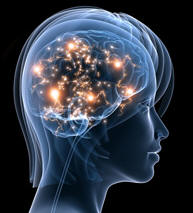Testosterone, the primary male sex
hormone,
appears to have antidepressant properties.
 Research
scientists at Florida State University, discovered
that a specific pathway in the hippocampus (a brain
region involved in memory formation and regulation
of stress responses) plays a significant role in
mediating testosterone's effects, according to a
new
report in Biological Psychiatry. Research
scientists at Florida State University, discovered
that a specific pathway in the hippocampus (a brain
region involved in memory formation and regulation
of stress responses) plays a significant role in
mediating testosterone's effects, according to a
new
report in Biological Psychiatry.
Women are twice as likely to suffer
from depression compared to men. Men with
a condition known as hypogonadism, in which the
body produces no or low testosterone, also
suffer increased levels of depression and
anxiety.
Testosterone replacement therapy has been shown
to effectively improve mood.
It is important to fully characterize how and where
the effects are occurring so that scientists can
better target the development of future
antidepressant therapies.
To achieve this goal, the scientists performed
multiple experiments in neutered adult male
laboratory subjects. They developed depressive-like
behaviors that were reversed with testosterone
replacement.The researchers also identified a
critical molecular pathway called MAPK/ERK2 (mitogen
activated protein kinase/ extracellular regulated
kinase 2) in the hippocampus that plays a major role
in mediating the protective effects of
testosterone.This suggests that the proper
functioning of ERK2 is necessary before the
antidepressant effects of testosterone can occur. It
also suggests that this pathway may be a promising
target for antidepressant therapies.
It's interesting to note the beneficial effects of
testosterone were not associated with changes in
neurogenesis (generation of
new neurons) in the hippocampus as it does
with other antidepressants like imipramine (Tofranil)
and fluoxetine (Prozac)."
Journal Reference:
Nicole Carrier, Mohamed Kabbaj. Extracellular
Signal-Regulated Kinase 2 Signaling in the
Hippocampal Dentate Gyrus Mediates the
Antidepressant Effects of Testosterone.
Biological Psychiatry, 2012
|